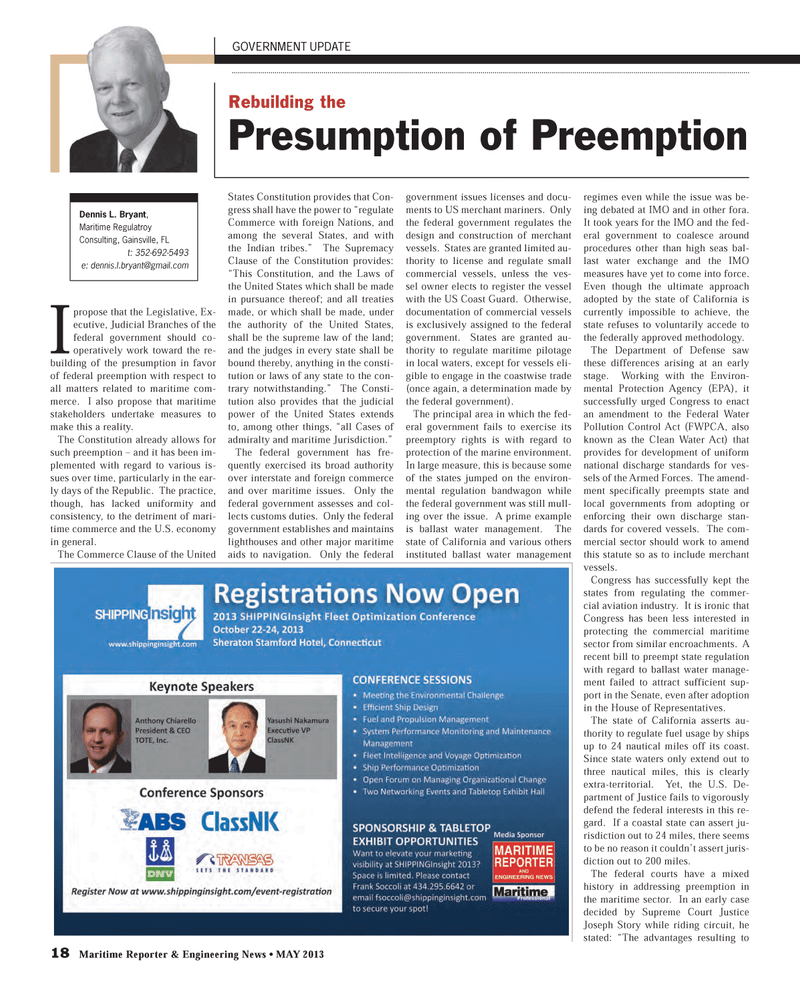
Page 18: of Maritime Reporter Magazine (May 2013)
Energy Production & Transportation
Read this page in Pdf, Flash or Html5 edition of May 2013 Maritime Reporter Magazine
I propose that the Legislative, Ex-ecutive, Judicial Branches of the federal government should co-operatively work toward the re-building of the presumption in favor of federal preemption with respect to all matters related to maritime com-merce. I also propose that maritime stakeholders undertake measures to make this a reality. The Constitution already allows for such preemption ? and it has been im-plemented with regard to various is-sues over time, particularly in the ear- ly days of the Republic. The practice, though, has lacked uniformity and consistency, to the detriment of mari- time commerce and the U.S. economy in general. The Commerce Clause of the United States Constitution provides that Con-gress shall have the power to ?regulate Commerce with foreign Nations, and among the several States, and with the Indian tribes.? The Supremacy Clause of the Constitution provides: ?This Constitution, and the Laws of the United States which shall be made in pursuance thereof; and all treaties made, or which shall be made, under the authority of the United States, shall be the supreme law of the land; and the judges in every state shall be bound thereby, anything in the consti- tution or laws of any state to the con-trary notwithstanding.? The Consti- tution also provides that the judicial power of the United States extends to, among other things, ?all Cases of admiralty and maritime Jurisdiction.?The federal government has fre-quently exercised its broad authority over interstate and foreign commerce and over maritime issues. Only the federal government assesses and col-lects customs duties. Only the federal government establishes and maintains lighthouses and other major maritime aids to navigation. Only the federal government issues licenses and docu-ments to US merchant mariners. Only the federal government regulates the design and construction of merchant vessels. States are granted limited au-thority to license and regulate small commercial vessels, unless the ves-sel owner elects to register the vessel with the US Coast Guard. Otherwise, documentation of commercial vessels is exclusively assigned to the federal government. States are granted au-thority to regulate maritime pilotage in local waters, except for vessels eli-gible to engage in the coastwise trade (once again, a determination made by the federal government). The principal area in which the fed-eral government fails to exercise its preemptory rights is with regard to protection of the marine environment. In large measure, this is because some of the states jumped on the environ-mental regulation bandwagon while the federal government was still mull-ing over the issue. A prime example is ballast water management. The state of California and various others instituted ballast water management regimes even while the issue was be-ing debated at IMO and in other fora. It took years for the IMO and the fed-eral government to coalesce around procedures other than high seas bal-last water exchange and the IMO measures have yet to come into force. Even though the ultimate approach adopted by the state of California is currently impossible to achieve, the state refuses to voluntarily accede to the federally approved methodology. The Department of Defense saw these differences arising at an early stage. Working with the Environ- mental Protection Agency (EPA), it successfully urged Congress to enact an amendment to the Federal Water Pollution Control Act (FWPCA, also known as the Clean Water Act) that provides for development of uniform national discharge standards for ves- sels of the Armed Forces. The amend- ment specifically preempts state and local governments from adopting or enforcing their own discharge stan- dards for covered vessels. The com- mercial sector should work to amend this statute so as to include merchant vessels.Congress has successfully kept the states from regulating the commer- cial aviation industry. It is ironic that Congress has been less interested in protecting the commercial maritime sector from similar encroachments. A recent bill to preempt state regulation with regard to ballast water manage-ment failed to attract sufficient sup- port in the Senate, even after adoption in the House of Representatives. The state of California asserts au-thority to regulate fuel usage by ships up to 24 nautical miles off its coast. Since state waters only extend out to three nautical miles, this is clearly extra-territorial. Yet, the U.S. De- partment of Justice fails to vigorously defend the federal interests in this re-gard. If a coastal state can assert ju-risdiction out to 24 miles, there seems to be no reason it couldn?t assert juris- diction out to 200 miles. The federal courts have a mixed history in addressing preemption in the maritime sector. In an early case decided by Supreme Court Justice Joseph Story while riding circuit, he stated: ?The advantages resulting to 18 Maritime Reporter & Engineering News ? MAY 2013 GOVERNMENT UPDATE Presumption of Preemption Rebuilding the Dennis L. Bryant, Maritime Regulatroy Consulting, Gainsville, FLt: 352-692-5493e: [email protected] #5 (18-25).indd 18MR #5 (18-25).indd 185/3/2013 1:07:58 PM5/3/2013 1:07:58 PM

 17
17

 19
19
